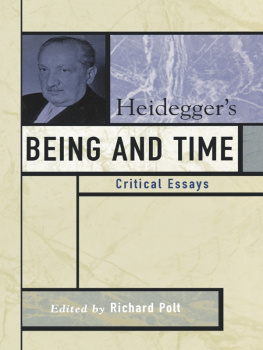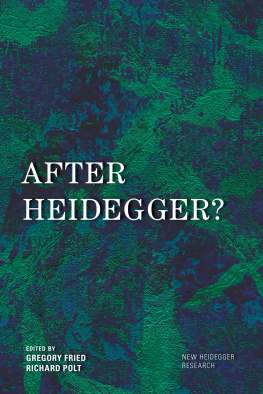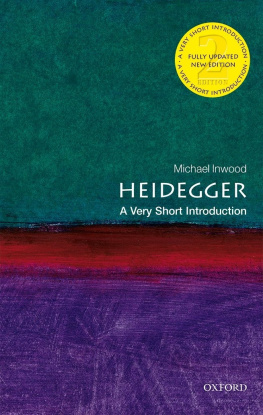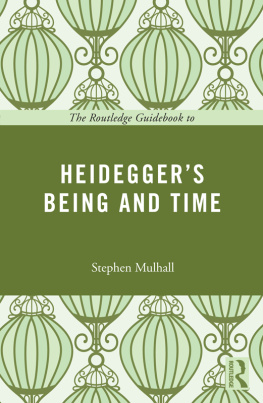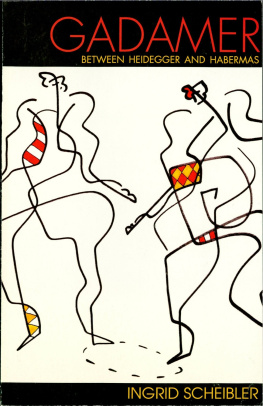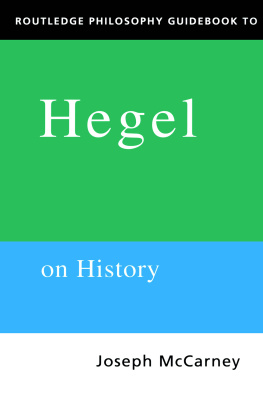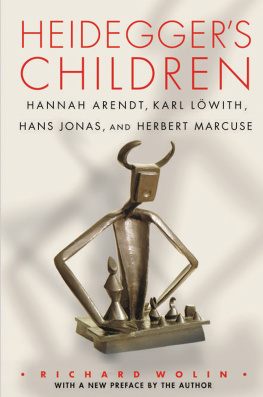Richard Polt - Heidegger: An introduction
Here you can read online Richard Polt - Heidegger: An introduction full text of the book (entire story) in english for free. Download pdf and epub, get meaning, cover and reviews about this ebook. year: 2004, publisher: Routledge, genre: Religion. Description of the work, (preface) as well as reviews are available. Best literature library LitArk.com created for fans of good reading and offers a wide selection of genres:
Romance novel
Science fiction
Adventure
Detective
Science
History
Home and family
Prose
Art
Politics
Computer
Non-fiction
Religion
Business
Children
Humor
Choose a favorite category and find really read worthwhile books. Enjoy immersion in the world of imagination, feel the emotions of the characters or learn something new for yourself, make an fascinating discovery.

- Book:Heidegger: An introduction
- Author:
- Publisher:Routledge
- Genre:
- Year:2004
- Rating:5 / 5
- Favourites:Add to favourites
- Your mark:
- 100
- 1
- 2
- 3
- 4
- 5
Heidegger: An introduction: summary, description and annotation
We offer to read an annotation, description, summary or preface (depends on what the author of the book "Heidegger: An introduction" wrote himself). If you haven't found the necessary information about the book — write in the comments, we will try to find it.
Heidegger: An introduction — read online for free the complete book (whole text) full work
Below is the text of the book, divided by pages. System saving the place of the last page read, allows you to conveniently read the book "Heidegger: An introduction" online for free, without having to search again every time where you left off. Put a bookmark, and you can go to the page where you finished reading at any time.
Font size:
Interval:
Bookmark:

Richard F.H. Polt 1999
This book is copyright under the Berne Convention.
No reproduction without permission.
All rights reserved.
First published in 1999 by UCL Press
Reprinted 2003 by Routledge
11 New Fetter Lane
London, EC4P 4EE
Transferred to digital print on demand, 2004
Routledge is an imprint of the
Taylor & Francis Group
British Library Cataloguing in Publication Data
A catalogue record for this book is available from the British Library.
Library of Congress Cataloging-in-Publication data are available.
ISBNs:
1-85728-719-3 HB
1-85728-720-7 PB
978-1-13457-423-0 EBK
Typeset by Graphicraft Limited, Hong Kong.
Printed and bound by Antony Rowe Ltd, Eastbourne
To my parents,
John H. R. Polt and Beverley A. H. Polt
The greatest danger in discussing a philosopher is that we will summarize the thinkers views without conveying the passion and wonder of the original thinking. As Heidegger puts it:
The widespread sterility of academic philosophy courses is... caused by the attempt to instruct the students with the well-known broad brushstrokes, in possibly one semester, about everything in the world, or about even more than that. One is supposed to learn to swim, but only goes meandering on the riverbank, converses about the murmuring of the stream, and talks about the cities and towns the river passes. This guarantees that the spark never flashes over to the individual student, kindling a light in him which can never be extinguished.
It may help if, from the very start, we give up the ambition to cover everything in the world. This book does not try to say everything that could be said about Heidegger. Even my relatively detailed analysis of his masterwork, Being and Time, discusses only the points that, in my judgment, are most helpful to the beginning reader of that text. The purpose of this book is never to replace Heidegger, but to help his readers especially those who are new to his writings to read him with more confidence and insight. There can be no substitute for thinking through the thoughts of philosophers themselves.
I have presented not only Heideggers positions, but also the questions that led him to his positions, and some of the further questions that can be asked. This approach is meant to encourage readers to learn to swim to participate with Heidegger in the activity of thinking.
Heidegger usually does not write for beginners in philosophy. He assumes that his readers have wrestled with the history of Western thought that they have awakened to its possibilities and suspected its limitations. The more one knows about other philosophers, the more one is likely to get from his writings. However, it is not really necessary to study Aristotle for 10 to 15 years (as Heidegger once advised his students to do) in order to profit from Heidegger. A relative novice in philosophy will find much that is stimulating and thought-provoking in his texts, and may even have an advantage over readers who are steeped in traditional philosophical concepts. This book presupposes as little specialized knowledge and vocabulary as possible, not only in order to be useful to a wide audience but also in order to encourage reflection because the jargon of professional philosophers can be used as an excuse not to think.
I have written with an eye to the entire range of Heideggers thought. Being and Time has been in print for over seven decades, but the greater part of his writings was unavailable until the publication of the Gesamtausgabe, or collected edition (Frankfurt am Main: Vittorio Klostermann, 1976 ). The collected edition will eventually include some 100 volumes; over 50 have appeared to date. Most of the lecture courses of 19191944 have now been published, along with other important, previously unavailable texts, such as the complex manuscript of the late thirties titled Contributions to Philosophy (On Appropriation) and a volume of dialogues composed in 194445. These materials have given us invaluable assistance in understanding Heideggers development and his concerns. It would be unhelpful and probably impossible to summarize all these texts in an introductory book, but I have used material from a wide variety of volumes of the Gesamtausgabe.
For the most part, this book proceeds in chronological order. considers some highlights of his later thought, providing guidelines for reading a number of important texts, including the Contributions to Philosophy and several shorter essays.
In notes, GA refers to the Gesamtausgabe. Full details on the collected edition and other texts cited, as well as suggestions for further reading, are in the bibliography.
In this as in other projects, I am grateful to Charles Guignon for his generous support and forthright judgments. His detailed comments on my manuscript were invaluable, as were those of Michael Baur, David Cooper, Lee Horvitz, Lou Matz, and John Shand.
To Gregory Fried I owe many insights about Heidegger gained during years of friendship and conversation.
I also owe special thanks to the graduates of Xavier University who commented on my work: Edward B. George, Andrew Hill, David Imwalle, Jonathan J. Sanford, and Phillip Wodzinski. What a pleasure it is for a teacher to learn from his former students.
This book is dedicated to my parents, with deep appreciation for their love and encouragement.
Finally, I thank Julie Gifford, my wife, for supporting the writing of this book in so many ways.
Celebration... is self-restraint, is attentiveness, is questioning, is meditating, is awaiting, is the step over into the more wakeful glimpse of the wonder the wonder that a world is worlding around us at all, that there are beings rather than nothing, that things are and we ourselves are in their midst, that we ourselves are and yet barely know who we are, and barely know that we do not know all this. Martin Heidegger
Why is there something rather than nothing? Strange as this question is, it seems oddly familiar. Puzzling though it is, it has a certain unique simplicity.
This is not to say that it can be answered in the way we might answer the question, Why do birds migrate to the same place every winter? or Why is there more crime in the United States than in Japan? These questions stand a chance of being resolved by scientific research. But no scientific investigation can tell us why there is something rather than nothing. Science describes the things we find around us, and it explains how some of these things are caused by others, but it cannot say why the whole exists. The Big Bang theory may be correct but it does not answer why there was a Big Bang rather than nothing. We might say that God made the Big Bang. But then, why is there God? Perhaps God exists by necessity. However, few thinkers these days accept the idea of a necessary being whose existence we can know and prove. Most would agree that whatever we may propose as the cause of everything is itself something whose existence stands in need of explanation. It looks very much as if our question, Why is there something rather than nothing? reaches beyond the power of human reason. It is beginning to seem that our question simply cannot be answered at all.
For Heidegger, our question is deeply meaningful. He ends his 1929 essay What is Metaphysics? with it, and it opens his lecture course Introduction to Metaphysics (1935). More precisely, Heidegger asks: Why are there beings at all, and not rather nothing?
Font size:
Interval:
Bookmark:
Similar books «Heidegger: An introduction»
Look at similar books to Heidegger: An introduction. We have selected literature similar in name and meaning in the hope of providing readers with more options to find new, interesting, not yet read works.
Discussion, reviews of the book Heidegger: An introduction and just readers' own opinions. Leave your comments, write what you think about the work, its meaning or the main characters. Specify what exactly you liked and what you didn't like, and why you think so.

